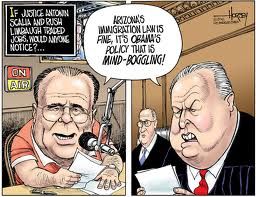“Punting the Pundits” is an Open Thread. It is a selection of editorials and opinions from around the news medium and the internet blogs. The intent is to provide a forum for your reactions and opinions, not just to the opinions presented, but to what ever you find important.
Thanks to ek hornbeck, click on the link and you can access all the past “Punting the Pundits”.
Follow us on Twitter @StarsHollowGzt
New York Times Editorial: The Radical Supreme Court
The Supreme Court’s landmark decision upholding the Affordable Care Act was a deft turn by Chief Justice John Roberts Jr., who voted with the court’s four moderate liberals for the first time in a 5-to-4 ruling. Yet, while they upheld the law’s mandate for individuals to buy insurance under Congress’s taxing power, the chief justice joined the four other conservatives to reject that provision under the Constitution’s commerce clause.
That rejection underscores the aggressiveness of the majority’s conservatism and marks a stunning departure from the long-established legal consensus that Congress has broad power to regulate the economy.
Paul Krugman: Europe’s Great Illusion
Over the past few months I’ve read a number of optimistic assessments of the prospects for Europe. Oddly, however, none of these assessments argue that Europe’s German-dictated formula of redemption through suffering has any chance of working. Instead, the case for optimism is that failure – in particular, a breakup of the euro – would be a disaster for everyone, including the Germans, and that in the end this prospect will induce European leaders to do whatever it takes to save the situation.
I hope this argument is right. But every time I read an article along these lines, I find myself thinking about Norman Angell.
Who? Back in 1910 Angell published a famous book titled “The Great Illusion,” arguing that war had become obsolete. Trade and industry, he pointed out, not the exploitation of subject peoples, were the keys to national wealth, so there was nothing to be gained from the vast costs of military conquest.
The United States is in the midst of a vicious cycle of inequality and recession: Inequality prolongs the downturn, and the downturn exacerbates inequality. Unfortunately, the austerity agenda advocated by conservatives will make matters worse on both counts.
The seriousness of America’s growing problem of inequality was highlighted by Federal Reserve data released this month showing the recession’s devastating effect on the wealth and income of those at the bottom and in the middle. The decline in median wealth, down almost 40 percent in just three years, wiped out two decades of wealth accumulation for most Americans. If the average American had actually shared in the country’s seeming prosperity the past two decades, his wealth, instead of stagnating, would have increased by some three-fourths.
In some ways the data confirmed what was already known, but the numbers still shocked. We knew that house prices – the principal source of saving for most Americans – had declined precipitously and that trillions of dollars in home equity had been wiped out. But unless we understand the link between inequality and economic performance, we risk pursuing policies that will worsen both.
Devon G. Peña: Fear & Loathing in Texas: State Republican Party Seeks to Ban Critical Thinking in Public Schools
Platform Prohibits Teach Higher Order Thinking Skills
What is it about the political rightwing in the Lone Star State? It seems like they are now competing with Arizona to take the lead as the nation’s most anti-education and anti-intellectual state.
Here is the actual language from a position statement in the 2012 Texas Republican Party Platform:
“Knowledge-Based Education – We oppose the teaching of Higher Order Thinking Skills (HOTS) (values clarification), critical thinking skills and similar programs that are simply a relabeling of Outcome-Based Education (OBE) (mastery learning) which focus on behavior modification and have the purpose of challenging the student’s fixed beliefs and undermining parental authority.”
Where does this Republican fear of critical thinking come from? One would have to surmise it may be derived from two sources: Either (1) they learned some nifty reactionary ideas from the Arizona struggle against HB2281, the law banning the teaching of Chicana/o Studies in public schools, or (2) they understand that Texas public schools are now filled with a majority of minority [sic] students, most of them Mexican-origin, and it may not be a good idea to encourage them to become anything other than servants of the 1% by denying them anything but rote learning and vocational educations.
Robert Sheer: Supreme Court Leaves Romney in the Cold
Mitt Romney is an idiot or, even worse, is pretending to be one. His tantrum of a response on Thursday to the Supreme Court’s health care decision was pure playground: As president I will own the ball, and the game will be played by rules that leave me a winner.
That game has already been called in a decision written by the top-ranking conservative jurist, and shorn of the constitutional objection; Barack Obama’s health care plan now will be judged by its practical outcomes. Romney’s promise that “I will act to repeal Obamacare” from “my first day as president of the United States” is a prescription of destructive gridlock for a program already well under way.
By immediately committing to reverse a health care reform based on the very program he implemented as governor of Massachusetts, Romney has gone to war with himself. Obviously, neither he nor his advisers has yet grasped that the decision written by Chief Justice John Roberts has changed the terms of the debate.
Roger Bybee: Dems Paint Romney as “Outsourcer-In-Chief,” But Will Obama’s Trade Deal Blow It?
The Obama administration and Democrats have been busily puncturing Mitt Romney’s record as an experienced “job creator,” with a multi-pronged attack on Romney’s role as a “pioneer” in offshoring jobs while heading up the private-equity fund Bain Capital.
Backed up by an ever-mounting supply of evidence from the New York Times, Boston Globe, and the Washington Post, Obama and the Democrats have shredded Rommey’s arguments that he is the man to restore employment.
Yet recent leaks reveal that the Obama administration has been secretly negotiating with Pacific Rim nations the Trans-Pacific Partnership (TPP) trade deal, based on the job-destroying NAFTA model. Obama-as with his trade deals last year with South Korea, Panama, and human-rights pariah Colombia-is once more falling into line behind CEOs in promoting what he as a candidate fiercely denounced in 2008 as “trade deals like NAFTA and China [that] have been signed with plenty of protections for corporations and their profits, but none for our environment or our workers who’ve seen factories shut their doors and millions of jobs disappear.

 The heads of state of the EuroZone countries met in Brussels today for a two day summit to try to come to an agreement on
The heads of state of the EuroZone countries met in Brussels today for a two day summit to try to come to an agreement on  “Irrational exuberance”, “unrealistic expectations” accurately describe some of the reports about the alleged rebound in the housing market,
“Irrational exuberance”, “unrealistic expectations” accurately describe some of the reports about the alleged rebound in the housing market,  In his dissenting opinion on the
In his dissenting opinion on the
Recent Comments